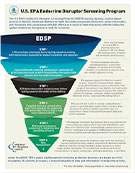June 16, 2016
Scientific group comments on release of EU criteria for identifying endocrine disrupting chemicals
DURHAM, NC (June 16, 2016) – The Endocrine Policy Forum (EPF), a consortium of scientific and regulatory experts coordinating industry participation in the U.S. Environmental Protection Agency (EPA) Endocrine Disruptor Screening Program (EDSP), issued the following statement in response to the release by the European Commission of criteria for identifying chemicals for their potential to interact with the endocrine system:
“The criteria released by the European Commission for identifying endocrine disrupting chemicals are not sufficient for the purposes of regulatory decision making and may lead to the unnecessary restrictions of important chemical products that do not pose a health risk. By deciding not to use all available relevant scientific information in their assessment of chemicals, European regulators may unintentionally increase overall health risks as necessary products become unavailable and less attention is provided to real risks.
“The EC’s criteria, which ignore potency and potential chemical exposure, will result in regulation of some chemicals as “endocrine disruptors” as if they would actually pose a health threat when, in reality, they cannot. Most exposures (even to food) elicit an endocrine response, and many chemicals may not be sufficiently potent to elicit an adverse response at any reasonable level of exposure. To be of any use, the criteria must incorporate potency and exposure in identifying endocrine disruptors.
“Other countries across the globe continue to pursue scientific, risk-based approaches to regulation, which take chemical potency and exposures into account when assessing risks. In the U.S., the EPA has developed a screening strategy capable of scientifically discerning endocrine active from endocrine disruptive chemicals through its Endocrine Disruptor Screening Program. A multi-agency effort called Toxicology in the 21st Century (Tox21) is aimed at developing new technology that will further speed chemical screening for all types of activity, increase accuracy of the results, and reduce the use of laboratory animals.
“The U.S. is also working to modernize toxicity testing and to make global chemical regulation more efficient and is sharing its approach and expertise with other member countries of the Organization for Economic Cooperation and Development to achieve a global harmonization of tests and methods.
“As consortium of scientists, the EPF supports scientific, risk-based approaches to screening, testing and regulating endocrine active chemicals. Our members look forward to continuing to work with the EPA and other stakeholders to further the science and understanding of how chemicals can interact with the endocrine system and take any necessary steps to ensure human health and the environment are protected.”
###
The Endocrine Policy Forum (EPF) is a consortium of scientific and regulatory experts coordinating industry participation in the U.S. Environmental Protection Agency (EPA) Endocrine Disruptor Screening Program (EDSP). The EPF represents more than 95 percent of the EDSP List 1 test order recipients. Our mission is to bring balanced, risk-based analysis to scientists and regulatory decision-makers to ensure chemicals are properly screened, tested and regulated for endocrine activity and the potential to cause adverse health effects.
Contact:
Christopher J. Borgert, Ph.D.
(352) 335-8334
cjborgert@apt-pharmatox.com
Ellen Mihaich, Ph.D., DABT
(919) 479-6947
emihaich@nc.rr.com



